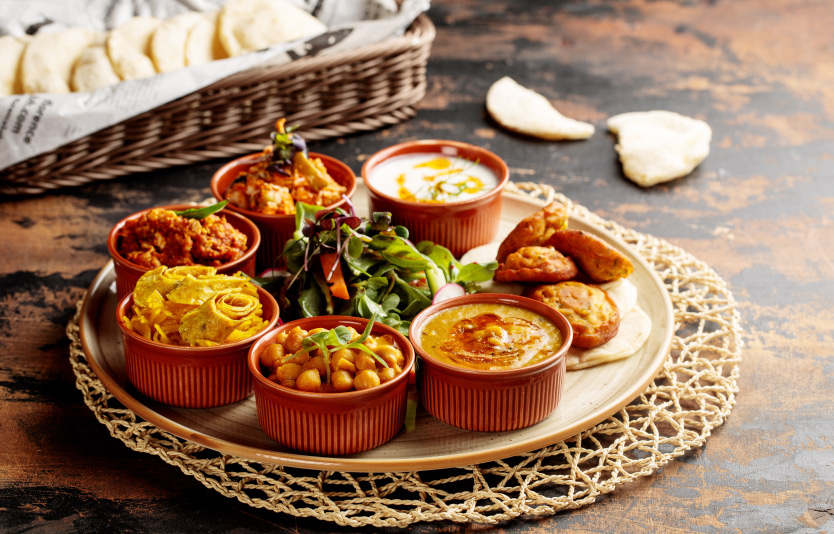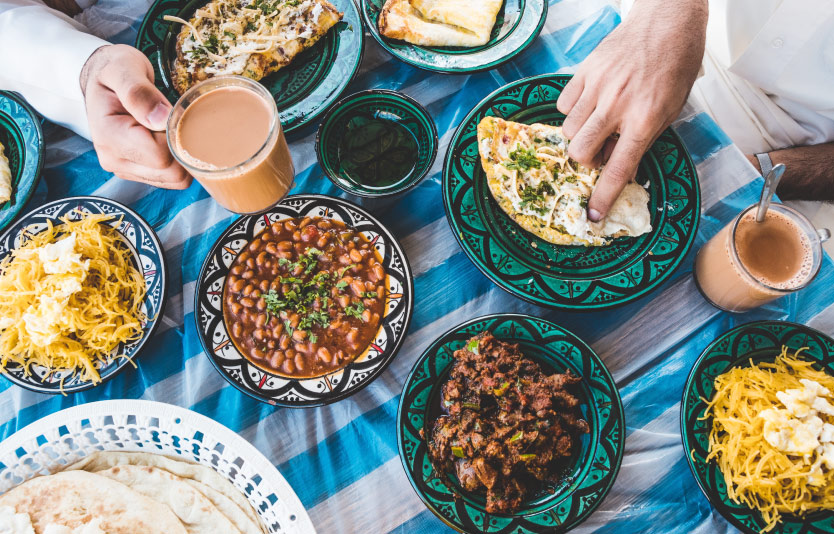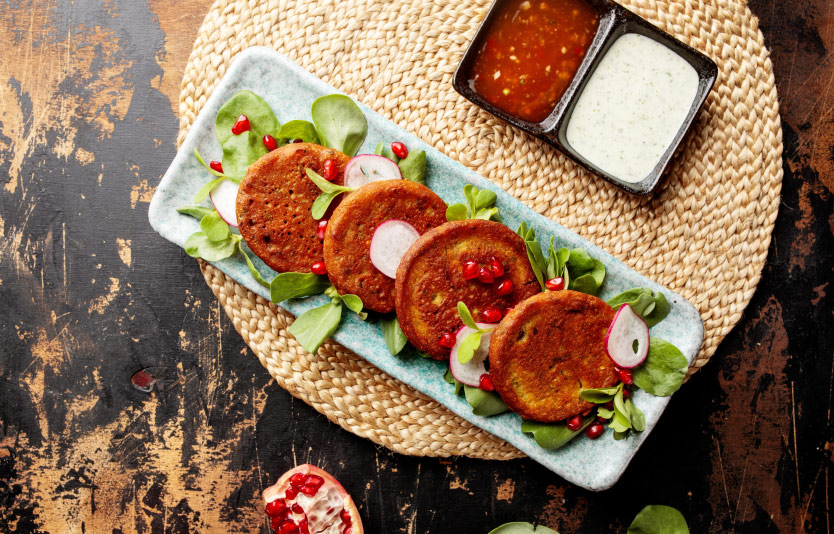A Culinary Journey Through Bahrain Cuisine: Your Guide to Traditional Flavors
June 19, 2025
Bahrain, the pearl of the Arabian Gulf, offers travelers far more than stunning architecture and rich history. The island kingdom's Bahrain cuisine represents a fascinating blend of Arabian, Persian, and Indian influences, creating a unique culinary identity that reflects centuries of trade and cultural exchange. From aromatic rice dishes to sweet delicacies, Bahraini food tells the story of a nation shaped by the sea, spice routes, and warm hospitality.
For food-loving travelers, exploring traditional Bahraini food is an essential part of any visit. The cuisine combines simple, high-quality ingredients—rice, fish, meat, dates, and aromatic spices—into dishes that are both comforting and exotic. Whether you're sampling street food in Manama's souks or dining in upscale restaurants, Bahrain's culinary scene offers authentic flavors that have been perfected over generations.

Bahrain Cuisine - traditional Bahraini food
The Heart of Bahrain Cuisine: Signature Dishes
Machboos: The National Pride Machboos stands as Bahrain's national dish and represents the essence of the country's culinary heritage. This spiced rice dish combines fragrant basmati rice with tender meat (chicken, lamb, or fish) and a distinctive blend of aromatic spices including saffron, cardamom, and cinnamon. What makes Machboos truly special is the use of Baharat (a special spice blend) and Loomi (dried lime), which create an explosion of flavors. The dish is typically garnished with fried onions, nuts, and fresh herbs, then served with Daqoos—a tangy green chili-based sauce.
Harees: The Comfort Food Classic Harees is a beloved traditional dish, especially popular during Ramadan. This hearty porridge-like creation combines wheat berries with meat (usually chicken or lamb) that's slow-cooked for hours until it reaches a smooth, creamy consistency. The dish is seasoned with warm spices like cinnamon, nutmeg, and black pepper, then often topped with ghee and a sprinkle of cinnamon. The preparation requires patience—wheat berries are soaked overnight and then cooked for over eight hours—making it a labor of love.
Muhammar: The Sweet and Savory Delight Muhammar showcases Bahrain's love for combining sweet and savory flavors. This distinctive rice dish gets its signature reddish color and sweetness from dates or caramelized sugar, enhanced with rose water and cardamom. Traditionally served alongside grilled or fried fish, particularly the local Safi fish, Muhammar creates a perfect balance of flavors that represents the island's maritime heritage.

The Sweet and Savory Delight
Essential Bahrain Cuisine Recipes to Try
Dish | Main Ingredients | Cooking Time | Difficulty Level |
Machboos | Basmati rice, chicken/lamb, Baharat spices, dried lime | 1.5 hours | Medium |
Harees | Wheat berries, meat, cinnamon, water | 10+ hours | Easy but time-consuming |
Balaleet | Vermicelli, eggs, sugar, cardamom, rose water | 30 minutes | Easy |
Balaleet: The Unique Breakfast Experience Balaleet represents one of Bahrain's most unique culinary creations—a dish that perfectly balances sweet and savory elements. This breakfast specialty combines sweet vermicelli noodles cooked with sugar, rose water, and cardamom, then topped with a fluffy omelet. The contrast between the sweet noodles and savory eggs creates a memorable flavor profile that surprises first-time visitors.
Bahraini Halwa: The Sweet Finale No exploration of Bahraini cuisine recipes is complete without trying Bahraini Halwa. This traditional dessert has been enjoyed locally for nearly a century and features a distinctive gelatinous texture achieved by combining cornstarch with caramelized sugar. Flavored with saffron, rose water, and cardamom, then topped with toasted nuts, halwa pairs perfectly with Arabic coffee.
Street Food and Casual Dining
Bahrain's street food scene offers accessible ways to experience traditional Bahraini food without formal dining:
- Samboosa: Triangular pastries filled with spiced meat, vegetables, or cheese, deep-fried to golden perfection
- Shawarma: Marinated meat carved from a rotating spit, wrapped in pita with fresh vegetables and sauces
- Malgoum: A Bahraini twist on shawarma, served in Indian paratha bread with cheese and French fries
- Falafel: Crispy chickpea fritters served in pita pockets with fresh greens and tahini sauce
Regional Specialties and Seafood
Bahrain's island location means seafood plays a central role in the cuisine. Popular local varieties include:
- Hammour (grouper): Typically grilled, fried, or steamed
- Safi (rabbit fish): Often served with Muhammar rice
- Sobaity (sea bream): Another local favorite, usually grilled
These fresh catches are often prepared with traditional spice blends and served alongside fragrant rice dishes, creating meals that celebrate both land and sea.

Specialties and Seafood
Beverages and Traditional Drinks
Arabic Coffee (Qahwah) Arabic coffee serves as Bahrain's national beverage and plays a crucial role in hospitality. This cardamom-flavored coffee is traditionally served with dates and represents the warmth of Bahraini culture.
Karak Chai the Indian-inspired milky, spiced tea, has become increasingly popular throughout Bahrain, reflecting the country's multicultural influences.
Cooking Tips for Bahrain Cuisine Recipes
When preparing Bahrain cuisine recipes at home, keep these essential tips in mind:
- Spice Quality Matters: Use fresh, high-quality spices, especially for Baharat blends
- Dried Lime (Loomi): This ingredient is crucial for authentic flavors—pierce before using
- Rice Preparation: Soak basmati rice for at least 30 minutes before cooking
- Slow Cooking: Many traditional dishes benefit from long, slow cooking processes
- Balance: Bahraini cuisine often balances sweet, savory, and aromatic elements
Cultural Significance and Dining Etiquette
Understanding the cultural context enhances your appreciation of traditional Bahraini food. Meals are typically communal affairs that bring families together. During Ramadan, special dishes like Harees take on additional significance as symbols of sharing and community. The preparation of large batches for distribution to neighbors and visitors reflects the generous spirit of Bahraini hospitality.
What is the most famous dish in Bahrain cuisine?
Machboos is widely considered Bahrain's national dish and most famous culinary creation. This spiced rice dish combines basmati rice with meat or fish, aromatic spices, and dried lime, creating a flavorful meal that represents the essence of Bahraini cooking.
Are Bahrain cuisine recipes difficult to make at home?
Most traditional Bahraini dishes use simple techniques and readily available ingredients. While some dishes like Harees require long cooking times, the actual preparation is straightforward. The key is using quality spices and being patient with slow-cooking processes.
What makes Bahraini food different from other Middle Eastern cuisines?
Bahraini cuisine is distinguished by its strong Persian and Indian influences, use of dried lime (Loomi), and emphasis on seafood due to its island location. The combination of sweet and savory flavors, particularly in dishes like Balaleet and Muhammar, also sets it apart.
What are the essential spices for cooking Bahraini food?
Key spices include Baharat (a local spice blend), dried lime (Loomi), saffron, cardamom, cinnamon, turmeric, and rose water. These ingredients create the distinctive flavor profiles that characterize traditional Bahraini dishes.
Is Bahraini cuisine suitable for vegetarians?
While many traditional dishes feature meat or seafood, Bahrain offers vegetarian options like Bahraini Kebab (chickpea flour patties), various rice dishes, and numerous appetizers and side dishes that cater to vegetarian diets.
Exploring Bahrain cuisine offers travelers an authentic taste of Arabian Gulf culture, where every dish tells a story of trade routes, cultural exchange, and generous hospitality. Before embarking on your culinary adventure in Bahrain, ensure your travel documents are properly arranged. GVC specializes in simplifying the visa process for travelers, allowing you to secure your travel authorization efficiently and focus on planning your gastronomic journey. Their transparent approach means you can review service costs upfront, helping you budget for both travel and the incredible dining experiences that await. Once your application is submitted, you can track your visa status online, giving you peace of mind as you prepare to discover the rich flavors and warm hospitality that make Bahraini cuisine truly special.
Related Articles:
- Best Restaurants In Bahrain A Culinary Journey Through The Kingdom
- Bahrain Travel Guide Everything You Need To Know Before You Go
- 10 Things To Do In Bahrain For First Time Comers
- Top Things To Do In Bahrain Travel Guide
- Visit Bahrain A Gem Of The Arabian Gulf
- Exploring The Best Places To Visit In Bahrain Manama
- Bahrain National Holidays Perfect Times To Visit Bahrain Manama
Tags




